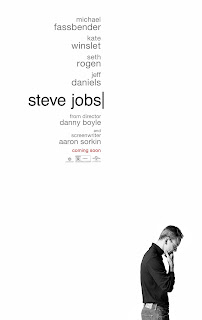Steve Jobs
And now for something actually worth seeing this week. I mean, aside for the Force Awakens for the 7th time...
(Or, in my case, only the 3rd - but I really do want to see it in IMAX)
Anyway, back to Steve Jobs, this review is also up at Channel 24.
What it's about
A character study of Apple founder Steve Jobs, centred around three product launches over three decades, that examines his work, his relentless quest for perfection and his extremely complicated, often adversarial relationships with even those closest to him.
What we thought
Standing in stark contrast to the decidedly ordinary biopic, Jobs, which saw Ashton Kutcher in the eponymous role trying his best – but ultimately failing – to capture the many diverse sides of Steve Jobs over pretty much his entire adult life, Steve Jobs is an almost impressionistic take on the man that says everything it really needs to say by focusing on a mere three vital days in his professional life. We don't get a play by play breakdown of the early days of Apple or his year's fighting the good fight against terminal cancer, but instead get a fully drawn portrait of the man himself, in all his brilliant, insufferable, contradictory and ultimately human glory.
No wonder it sank like a stone at the US box office.
Written by the incomparable Aaron Sorkin (The West Wing, The Social Network), there's something almost miraculous about Steve Jobs as a fully emotionally engaging and beautifully formed piece of cinema. Quite aside for just how much mileage it gets out of so tight a focus, you would be excused for doubting that Sorkin has something this profoundly human in him.
Yes, the West Wing had a cast of terrific characters and he did a fairly convincing portrait of Facebook founder, Mark Zuckerberg, in the Social Network, but his most recent project, the HBO series The Newsroom showed all the signs of a creative mind completely out of touch with actual human beings and how they acted. The Newsroom was often very smart, albeit in an often hectoring, heavy-handed way, but it also displayed not only the worst characterization by far of any Sorkin project to date, but some of the worst characterization in this “golden age of TV” in general. Aside for perhaps one or two exceptions, every single character on that show acted in ways that seem entirely contradictory to how real human beings would behave in similar situations, while bring fundamentally unlikeable in a way that only the really self-consciusly smart can be.
Considering the real-life Steve Jobs' notorious penchant for both very self-aware brilliance and supreme assholeishness, there was every indication that this would be less the Social Network and more that increasingly exasperating show. Fortunately, while it isn't quite as thrilling as the former, it's infinitely better than the latter and, quite amazingly, more humane than either. Sorkin is not afraid to write Steve Jobs as a truly horrible person whose treatment of those he apparently loves is often jaw-droppigly poor but also as a person who is far more nuanced, perhaps even far more genuinely good-hearted, than his asocial demeanour may suggest him to be; that he was never actually harder on anyone than he was on himself.
The film is also unafraid to question his so-called brilliance, as in the scene when the usually affable Steve Wozniak (superbly played by Seth Rogen in career-best form) calls out his former partner: “You're don't code. You're not a designer. What is it that you actually do?” Nonetheless, the Steve Jobs of the film is clearly every bit the visionary that the real Steve Jobs was – it's just that he could allow his arrogant refusal to listen to reason to utterly sink his visions every bit as often as it could elevate them.
Still, even if it never shies away from his work, this is really the story of the man and the relationships he had with those around him. Whether it's his constant berating of an underling, Andy Hertzberg (Michael Stuhlbarg) that he actually deeply respects, his condescending but protective attitude towards Steve Wozniak or the unappreciative way he treats his “work-wife”, Joanna Hoffman (Kate Winslet), none of his relationships are quite as dysfunctional as the one he has with his daughter, Lisa (played at different ages by Perla Haney-Jardine, Ripley Sobo and Makenzie Moss), of whose parentage he spends most of the movie steadfastly rejecting. It's amazingly compelling stuff with the entire terrific cast (including the best thing about the Newsroom, Jeff Daniels) holding their own against Michael Fassbender as Steve Jobs himself.
Ironically, if there's one person that has been woefully overlooked in all this, it's the film's director Danny Boyle, the brilliant British director of such diverse fare as 127 Hours, Trainspotting and Sunshine. And yet, it is he who makes Sorkin's supremely wordy script come to vivid, cinematic life and it is he who gets such brilliant performances from his already mostly dependable cast. Sure, it feels more like a Sorkin movie than a Danny Boyle movie but that speaks both to Boyle's chameleon-like ability to step back and give the script exactly what it needs to work and to just how vital the right director is to ensuring that Sorkin's script doesn't just implode on itself.
All credit to Sorkin and the brilliant cast, to be sure, but it's Boyle and editor Elliot Graham (this is one of those rare cases where you notice the editing for all the right reasons) that make Steve Jobs one of the very best films of the year. That's right, forget its mixed reception, this is truly must-see stuff that I, for one, could not recommend highly enough.


Comments
Post a Comment